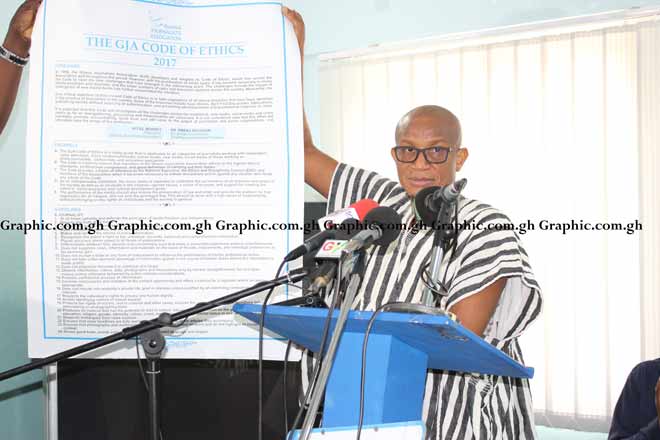The Ghana Journalists Association (GJA) has launched its revised Code of Ethics aimed at promoting professionalism in journalism practice in Ghana.
The objective of the revised Code of Ethics is to take cognisance of all the ethical breaches that have been identified in the practice of journalism in the country.
It would be recalled that in 1994, the GJA developed and adopted its Code of Ethics which has served the Association well through the period.
However, with the proliferation of media types, it had become necessary to revise the code to meet new challenges that have emerged in the intervening years.
The challenges include the impact of media pluralism and diversity, the emergence of social media and the sheer numbers of radio and television stations across the country.
The new GJA Code of Ethics is a ready guide that is applicable to all categories of journalists working with newspapers, radio, and television, cross media/multimedia, social media or those working as photo journalists, cartoonists, and animation specialists.
The code is meant to ensure that members of the Ghana Journalists Association adhere to the highest ethical standards, professional competence, and good behaviour in carrying out their duties.
It provides a frame of reference to the National Executive, the Ethics and Disciplinary Council, and members of the Association when it becomes necessary to initiate disciplinary action against any member who flouts any article of the code.
The panel, who put together the GJA revised Code of Ethics, were Dr Kweku Rockson, Consultant and Team Leader; Mr Yaw BoaduAyeboafoh, an accomplished Ethicist and Columnist; Mrs Gina Blay, a Publisher; Mr Kwame Ahiabenu, a New Media Expert and Teacher; Mr Fortune Alimi, Editor of a leading private newspaper; and Dr Doris Yaa Dartey, a veritable institution of media training and development.
Mr Mustapha AbdulHamid, the Minister of Information, who formally launched the revised GJA Code of Ethics, said it must serve as a launching pad to propel the journalism profession in the country into a better phase.
He said any association which had no ethics was not worth joining; saying; “it is our ethics that give us a sense of humanity’.
Mr AbdulHamid, himself a trained journalist, described the journalism profession as the best profession in the whole world, adding that journalism was essential for any democracy to succeed.
Mr Affail Monney, the President of the GJA, said the revised code had come at the right time to help cure the skyrocketing disease of ethical travesty across the media spectrum.
He urged journalists to regard the code as their professional Bibles and Qurans, declaring that; “devoid of any campaign drive, the new code is one of the legacies we bequeath to the media fraternity”.
Mr Daniel Fennel, the Public Affairs Officer of the United States Embassy, urged journalists to continue to be honest, accurate and fair in their reportage.
He said Ghana’s credentials as the beacon of democracy in Africa would partly be attributed to its free and vibrant media.
Dr Kweku Rockson said the revised Code encompassed all challenges across the traditional, new media, social media and across media as far as newsgathering, processing and dissemination were concern.
“It is our considered view that this effort will inevitably promote accountability,” he said.
Nana Gyan Apenteng, the Chairman of the National Media Commission, who chaired the launch, said over the past decade technological advancement such as the advent of social media had challenged the journalism profession.
He said no matter the level of technological advancement, the journalism profession would always abide as a profession.
Dr Lawrence Tetteh, an International Evangelist, said: "Anybody who lives without ethics has no future.

